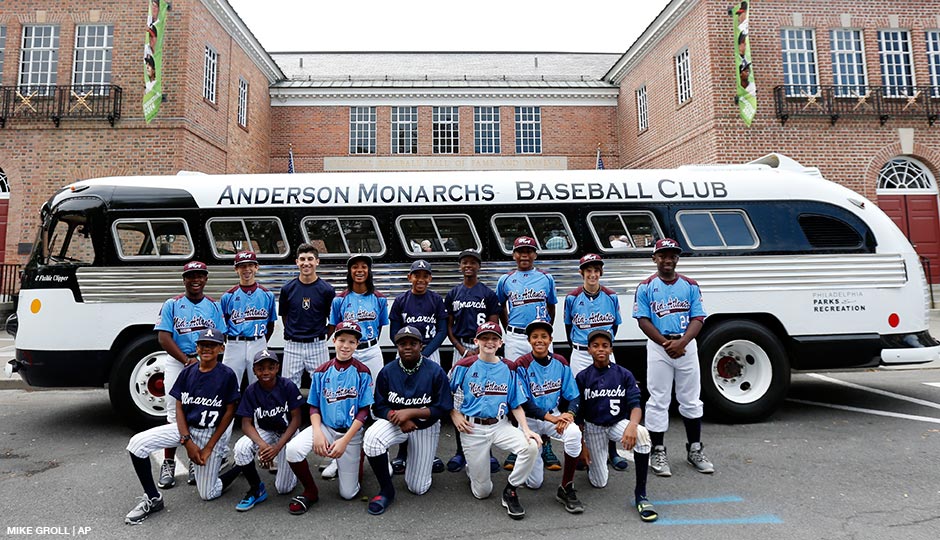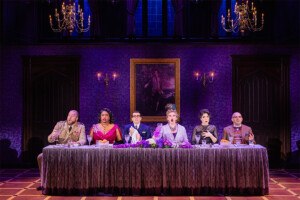Philly’s Anderson Monarchs Taking Trip of a Lifetime

Members of the 2014 Taney Little League-Anderson Monarchs teams pose for a photo with their team bus in front of the Baseball Hall of Fame on Thursday, Sept. 25, 2014, in Cooperstown, N.Y. Pitcher Mo’ne Davis is fourth from left.
This summer, a group of Philly 13-year-olds — including phenom Mo’ne Davis — will board a nearly 70-year-old bus and embark on a three-week trip through history. Starting in Washington, D.C., the Anderson Monarchs — a Philadelphia Parks and Recreation and Philadelphia Youth Organization-sponsored baseball team — will hit cities including Richmond, Atlanta, Birmingham, Selma, Memphis, Little Rock and New York as they learn about the Civil Rights movement and play baseball.
This trip, lauded in Frank Bruni’s most recent New York Times column, will be the fourth the Monarchs have taken, said coach Steve Bandura, a Parks and Recreation employee who founded the team in 1989. Past summer tours have focused on the legacy of Jackie Robinson and on baseball’s Negro Leagues. The bus the team uses is from 1947, the year in which Robinson, while a member of the Brooklyn Dodgers, broke baseball’s color barrier. When deciding on the focus of the trip, Bandura first chooses the educational itinerary, then gets in touch with local teams to organize the ballgames. Along the way, the group attends Major League ballgames as well. And on this trip, the Monarchs will play a game at Wofford College, where one of their former players, Demetrius Jennings, attends and plays Division 1 baseball.
The Monarchs will also have the chance to meet and speak with surviving Negro League players — including all-time home runs leader Hank Aaron, who started his career as a member of the Indianapolis Clowns — in some of the cities they visit.
All along the way, the 13-year-olds will learn about the Civil Rights movement by visiting the locations of some of its most pivotal events: Memphis, where Martin Luther King Jr. was assassinated; Atlanta, his home and burial place; Selma, the site of the famous Civil Rights march; Washington, D.C, where the kids will meet with a congressman involved in civil rights and visit the White House; Little Rock, the home of the first fully integrated high school; and New York, where Robinson played, lived and is buried.
“It’s one thing to read a book and watch a documentary,” Bandura said of the trip’s educational impact. “It’s a whole other thing to see and walk through the places where these things happened.”
The Monarchs have been meeting every Friday for the past six months to read books and watch documentaries to gain historical understanding to make their visits memorable.
Along with sponsorship help from Major League Baseball and sports equipment company Easton, the kids raise money for the trip by fundraising throughout the year. It helps, Bandura said, that the organization has a proven track record in the community.
Why is the trip so powerful? Many of the kids on the Monarchs are African-American, Bandura said, and come from working-class upbringings, the same types of backgrounds that many who played Negro League baseball came from. The group of 12 to 15 kids is picked every two years from a local tee-ball team as 7-year-olds, and they stay together until high school or college. Bandura coaches the 8- and 14-year-old teams and uses the help of former players and local dads to coach teams of 10- and 12-year-olds — as well as the 8-year-olds when the oldest group is touring. He also runs the tee-ball league whose 12 teams bear the names of former Negro League squads. Even kids who have moved — including one who now lives in Delaware — stay involved on the team, a testament to the program’s impact, as well as the honor of being a part of it. Along with baseball, the kids play organized basketball and soccer, and the education and community are more important than athletic skill: “The kids are like brothers and sisters, a family,” says Bandura.
From Washington, D.C. to Virginia, Atlanta to Birmingham and Selma, Memphis to Little Rock and all the way to Brooklyn, the Monarchs will soon embark on the trip of a lifetime. Decades of Civil Rights history in three weeks, and plenty of baseball to go with it.
Follow @MaxGRettig on Twitter.


